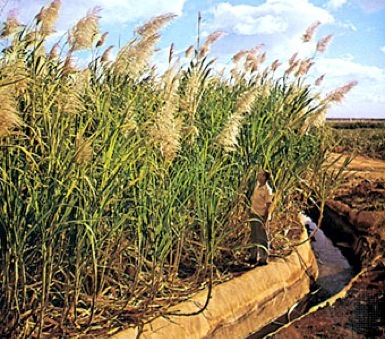The Environmental Impact of Growing Sugar and Cane in Various Regions
The Environmental Impact of Growing Sugar and Cane in Various Regions
Blog Article
Why Walking Cane Sugar Processing Chemicals Are Important for Modern Sugar Refining
The role of walking cane sugar handling chemicals in contemporary sugar refining can not be overemphasized, as they are integral to boosting both the effectiveness of removal and the general quality of the end product. Agents such as phosphoric acid and particular flocculants are utilized to eliminate contaminations, causing sugar that not only satisfies customer assumptions however also follows market criteria. Nevertheless, the effects of these chemicals extend past quality, discussing market characteristics and ecological factors to consider. This raises vital concerns concerning the sustainability of such methods and their impact on the future of sugar manufacturing.
Role of Handling Chemicals
The efficiency of walking cane sugar handling pivots significantly on the calculated application of processing chemicals. These chemicals play a crucial function in boosting the performance and top quality of sugar removal and refining. From the preliminary phases of juice removal to the last purification steps, handling chemicals assist in numerous essential procedures.
In the removal phase, chemicals such as phosphoric acid and calcium hydroxide are employed to optimize the information procedure, assisting to eliminate contaminations and put on hold solids from the cane juice. This not just enhances the yield but additionally makes certain the clearness of the end product. Additionally, representatives like flocculants help in the rapid settling of impurities, thereby enhancing the overall procedure.
Activated carbon and ion exchange materials serve to eliminate shade and odor, making sure that the refined sugar meets customer high quality criteria. Therefore, the meticulous selection and application of these chemicals are crucial for attaining optimum outcomes in walking stick sugar processing.
Key Types of Chemicals
Cane sugar processing relies upon a range of essential chemicals that help with each stage of manufacturing. These chemicals play necessary duties in clearing up, bleaching, and purifying the sugar drawn out from walking cane.
One key category of chemicals includes flocculants, such as polyacrylamide, which help in the explanation process by advertising the aggregation and settling of impurities. Furthermore, calcium hydroxide is usually employed to neutralize acidity and assist in the elimination of non-sugar components.
Lightening agents, such as turned on carbon and sulfur dioxide, are made use of to decolorize the syrup, resulting in a clearer end product. These chemicals assist remove shade substances that might affect the sugar's look and bankability.
Furthermore, phosphoric acid serves as a pH regulatory authority during the processing stages, ensuring optimum problems for the chemical tasks associated with sugar removal and filtration.
Various other crucial agents include edta (ethylenediaminetetraacetic acid), which chelates metal ions that might catalyze unfavorable responses, and sodium hydroxide, which helps in pH control throughout the refining procedure. Collectively, these chemicals boost performance and guarantee a top notch walking cane sugar product.
Advantages for Sugar Quality
Frequently neglected, using certain handling chemicals considerably improves the overall quality of walking cane sugar. These chemicals play an essential function in refining procedures, making sure that the final product fulfills strict market standards for purity and preference.

In addition, refining chemicals aid in achieving a consistent granulation and texture, which are critical for customer approval. By controlling this page the crystallization process, these chemicals ensure that the sugar crystals create uniformly, leading to an extra attractive product that dissolves well in different applications.
Moreover, the usage of these chemicals can boost the rack life of walking cane sugar by decreasing dampness absorption and microbial development. Overall, the tactical application of processing chemicals is crucial for providing high-quality cane sugar that fulfills customer assumptions and market demands.
Environmental Influence Factors To Consider

Moreover, the energy-intensive nature of sugar refining, compounded by chemical usage, often results in enhanced carbon discharges. This adds to environment change and raises problems concerning the sustainability of current refining practices. In addition, the sourcing of these chemicals may entail practices that threaten biodiversity, such as monoculture farming, which minimizes the durability of farming environments.

To reduce these impacts, sugar refiners are significantly discovering sustainable alternatives and taking on finest practices that decrease linked here chemical usage. Implementing rigorous environmental management systems can help ensure that the refining process lines up with ecological requirements and advertises biodiversity. Eventually, a balanced strategy that prioritizes both sugar quality and ecological stewardship is essential for the long-lasting stability of the sugar market.
Future Trends in Refining
As the sugar sector faces the environmental challenges connected with traditional refining techniques, innovative methods are arising to improve both performance and sustainability. One considerable trend is the adoption of environment-friendly chemistry principles, which prioritize making use of non-toxic, biodegradable handling chemicals. This shift not only lessens environmental influence however additionally addresses consumer need for cleaner manufacturing techniques.
One more appealing growth is the execution of sophisticated purification innovations, such as membrane splitting up and adsorption processes. These methods improve the quality and quality of the sugar while reducing the quantity of wastewater produced throughout refining. Furthermore, the integration of electronic technologies, including IoT and AI, is transforming operational effectiveness by allowing real-time monitoring and predictive maintenance, thus reducing resource waste.
Furthermore, using by-products from sugar refining, such as bagasse and molasses, is obtaining grip. These materials can be exchanged biofuels or value-added products, adding to a circular economic climate within the sector. Collectively, these patterns indicate a change in the direction of more lasting techniques that not only enhance functional effectiveness yet additionally line up with global sustainability objectives, guaranteeing the future stability of sugar refining.
Final Thought
Walking cane sugar processing chemicals are vital in modern sugar refining, considerably enhancing the effectiveness and high quality of sugar removal. The strategic use these chemicals not just improves the purity and taste of the end product yet also ensures regular formation and structure. As the market significantly prioritizes sustainability, the adoption of environmentally-friendly processing representatives is most likely to shape future fads in refining, inevitably bring about better products and prolonged rack life for customers.

Inevitably, a well balanced strategy that focuses on both sugar high quality and ecological stewardship is important for the long-lasting practicality of the sugar market.
Cane sugar processing chemicals are essential in modern sugar refining, dramatically boosting the performance and high quality of sugar extraction.
Report this page